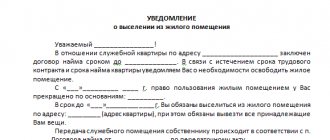Reasons
Grounds for eviction, the presence of which does not require the provision of new premises to residents, are enshrined in Article 91 of the Housing Code of the Russian Federation. Here they are:
- Use of the premises for purposes other than its intended purpose. This can be the production of products, or the opening of a store or office, or use as a warehouse. In general, anything that is not related to human habitation is an illegal use. Such use does not always imply profit. For example, a citizen can use an apartment to house homeless pets, while he himself lives in another place. However, in a situation where an apartment is rented out to residents, it is impossible to talk about illegal use of real estate, since the main condition (occupancy) is met.
- Intentional damage or destruction of residential premises. This point specifically implies the deliberate introduction of changes to the housing structure, to communication systems, which not only disrupt normal functioning, but also create a danger to life and health. This may include demolition of walls, connection to gas supply without coordination with the relevant services.
- Maintaining living quarters in unsanitary conditions. The legislator obliges each tenant to monitor the condition of his apartment. Of course, if you don’t do wet cleaning in your house for a month, then no one will kick you out of the apartment. But if the owner of the apartment clutters it, has a huge number of cats or dogs that he simply does not have the strength to care for, then the neighbors’ appeal to the sanitary and epidemiological service may become a reason for eviction.
- Violation of the rights of third parties. If a tenant leads an antisocial lifestyle, for example, uses alcohol, drugs, is rowdy, makes noise at night and otherwise interferes with the normal life of neighbors, then they can initiate the procedure for eviction. You can learn more about how to evict an alcoholic neighbor from this article.
- Termination of the right to use residential premises. This wording means the expiration of the lease agreement, the sale of the apartment, or the dissolution of family relationships (divorce, challenging paternity, deprivation of parental rights, etc.). In these cases, the apartment owner is not obliged to provide the evicted person with new housing.
- Seizure and sale of an apartment “for debts.” This applies only to apartments owned by the tenant, for example, if the housing is pledged to the bank, and the person does not fulfill his loan obligations, then it can be sold, and the debtor will be evicted and the bank is not obliged to provide him with housing. But if a municipal tenant has accumulated debts for utilities, then he must be provided with housing, but according to hostel standards, and comfortable living quarters can no longer be offered.
- Self-occupied property. If tenants live in an apartment without a reason, then no one is obliged to provide them with housing upon eviction.
Example. Citizen Fadeev P.S.
purchased two neighboring apartments located on the first floor of a nine-story building. He decided to unite them and demolish the dividing wall, but did not coordinate the redevelopment project with special services, but called workers who began demolishing the wall. Since the wall structure was load-bearing, cracks appeared in the apartments located on the floor above. The housing inspection commission conducted an examination and established a cause-and-effect relationship between the cracks that had arisen and the demolition of the wall between Fadeev’s apartments. The latter was given an order to eliminate the violations, but he refused to comply, citing the high cost of repairs. The neighbors filed a lawsuit to evict Fadeev and carry out repair work at his expense. The court, taking into account that Fadeev has another apartment where he lives and has no other property that could be foreclosed on, satisfied the claim in full.
What does judicial practice say?
Judicial practice will help you understand in more detail how the owner is evicted . Legal grounds, confirmed by an extensive amount of evidence, as practice shows, incline the court to make a decision in favor of the plaintiff.
As for cases on the issue of eviction of tenants from dilapidated buildings, in reality there is no consensus. Satisfying either party will require consideration of the specific situation.
Looking at the big picture requires an individual approach. In addition, an important condition for making a decision should be guidance from the Constitution and legislation of the Russian Federation.
Who can be evicted
Both the owner and the tenant of social housing can be evicted without providing new housing. However, it is quite difficult to evict the owner. So, the following citizens can be evicted and not provided with a new apartment:
- former spouses (if the apartment or part thereof does not belong to them by right of ownership);
- persons leading an immoral and antisocial lifestyle;
- debtors;
- former owners of the apartment;
- persons using housing for other purposes;
- deprived of parental rights;
- other categories of citizens.
Who can't be evicted
The Housing Code of the Russian Federation defines categories of persons who, under no circumstances, can be evicted from an apartment without the provision of living quarters:
- disabled people;
- persons declared incompetent;
- minors.
Everyone else can be evicted, but in some cases it will take more time and effort.
Example. The Eliseevs and their minor son lived in an apartment that was owned by the husband. The child and wife were registered. In 2010, the Eliseevs divorced, and in 2011, the husband filed a lawsuit to challenge paternity. A forensic examination was carried out, which confirmed that the child is not Eliseev’s biological son. The Civil Registry Office record of paternity was removed from the birth certificate. The ex-husband filed a lawsuit to evict a minor from the apartment, who was not his son. The court rejected the claim, since the child had no other place of residence.
Time limits within which a court decision must be executed
As a result of the execution of the court's decision, the defendant undertakes to comply with the conditions and terms. A specific date for the defendant to vacate the premises is not specified, but it must be within reason.
Seizure of real estate occurs under the control of bailiffs. His release is carried out no later than six months after the start of enforcement proceedings.
The defendant's right of residence ends 6 calendar months after full settlement with the former owner, if the case was based on a buyout transaction.
Procedure for eviction without provision of other housing
As mentioned above, only a judicial authority can make a decision on eviction and not providing another property for residence. If employees of some other government authorities (police, housing inspection, municipality) try to evict you without a court decision, they may be held accountable, even criminally. Let's take a closer look at how eviction occurs without providing another apartment.
Who is filing the claim?
A claim for eviction may be filed by the following persons:
- owner;
- municipality;
- third parties whose interests are violated (neighbors).
Algorithm of actions
In order to evict from an apartment people who, in your opinion, should not live in the apartment and at the same time not provide them with a new apartment, you must follow the following sequence of actions:
- try to resolve the issue pre-trial, for this you can send a demand for eviction (you can learn how to correctly draw up this document and download its sample at this link);
- collect documents confirming your case;
- enlist the support of witnesses (neighbors);
- draw up a statement of claim;
- pay the mandatory tax fee;
- participate in court proceedings, bring objections, present evidence, speak out in the debates of the parties;
- obtain a decision from a judicial authority;
- To achieve its execution, it may be necessary to involve bailiffs.
Process
If the pre-trial dispute resolution procedure does not produce results, then the only way to assert your rights is to go to court. It is necessary to contact the district court of general jurisdiction at the defendant’s place of residence (that is, at the address of the location of the disputed living space), and prepare a complete package of documents.
After the court's decision, the defendant may still refuse to voluntarily evict. In this case, you will have to apply with a writ of execution (which can be obtained from the office of the judicial authority) to the bailiff service. The bailiff will initiate enforcement proceedings, within the framework of which he will evict the tenant, as well as empty the apartment of his belongings and pets.
Statement of claim
The statement of claim is drawn up according to the general rule. It must contain the following information:
- full details of the plaintiff;
- name of the judicial authority;
- the most accurate information about the defendant;
- data of the representative with reference to the document establishing his powers (power of attorney, organization order);
- the essence of the dispute with references to title documents;
- motivated requirements, it would not be amiss to indicate the legal acts to which you refer;
- list of documents;
- details of the witnesses you wish to hear in court;
- date, signature.
Documentation
The following documents must be attached to the statement of claim for eviction without provision of other premises:
- plaintiff's passport;
- statutory documents of a legal entity (if it is the plaintiff);
- passport of the representative (if he is involved in the case);
- power of attorney (if required);
- title documents for housing;
- evidence of the validity of the plaintiff's claims. Depending on the situation, this may be a certificate of divorce, a conclusion from the housing inspection or sanitary and epidemiological station, and certificates from the police;
- receipt of payment of the mandatory tax fee (state duty).
These documents can be provided in copies, but you should be prepared that you will need to present the originals to the court.
Deadlines
There are no exact deadlines for consideration of claims related to disputes regarding eviction without provision of alternative housing. The claim will be considered for at least two months. And the maximum period can be calculated in years. It all depends on the positions of each party and the circumstances that require additional verification.
Price
The cost of going to court is determined only by the amount of the state duty, the amount of which is established in the Tax Code of the Russian Federation. Legal entities will have to pay 6,000 rubles, and individuals -300 rubles.
A receipt for payment must be submitted to the court along with the statement of claim. Otherwise, the claim will simply remain without consideration.
Features and nuances
The eviction process is always complex, both morally and legally. If only because we have to work hard to prove that :
- further human habitation in this territory is impossible, if not dangerous;
- Previously, they tried to settle the issue amicably with the offender, but he does not understand the words (correspondence, notification stubs are presented);
- The proceedings are not based on a personal conflict.
In any case, your interests in this case should be defended only with the help of a good lawyer . The average person simply will not be able to take into account all the nuances, which will give the opponent additional advantages.
If you find an error, please select a piece of text and press Ctrl+Enter.









